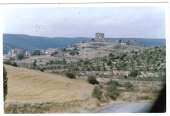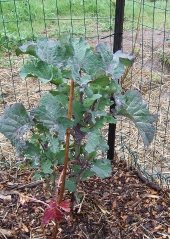Tristan,
A root cellar is just a shelter that does double duty as a place to store food from your harvest and get it through the winter. It doesn't have to be just roots. Lots of people store hard fruits, like apples and other vegetables like winter squashes and so forth in there too. I've even seen some more elaborate 2 or 3 room shelters that include areas for canning jars and even meat lockers. I've also seen versions that were little more than a hole in the ground lined with chicken wire to keep the critters out, then padded with straw and covered over with metal sheets or old windows. Those work fine for potatoes, carrots or turnips when you don't have a huge garden or a lot of indoor storage space.
The biggest problem with having a root cellar in the Ozarks is that we don't have a lot of soil to dig one in except in low areas around rivers and lakes and up around the upper part of Missouri. It's mostly limestone on the western side below the Missouri River, and tends to granite over along the Mississippi on the eastern side. (Granite is pretty much all you see from about halfway down the eastern side to the bootheel and then over toward the center along the bottom of the state. That is the area of the New Madrid fault -- the one area in the midwest that gets the BIG earthquakes like out in California. Anyway, back to root cellars... Most folks build a sturdy shelter by digging down as far as possible (maybe 2 to 4 feet tops); building the room in the hole and then berming or covering it up with the dirt from the excavation. It makes a mound. With a door set into it on one side for access, you're all set. The best way to build it would be to put a small ferro-cement dome in the hole and cover that up. Domes are very strong anyway, but with all the steel and cement over it, you'll have a bomb shelter as well as protection from high winds.
About chiggers. They itch like hell, but otherwise are not as bad as everyone seems to think. Most people who live here just get used to itching because there isn't a lot you can do about them except never go out. If you are one of those people who just has to use something, I have found that Avon's Skin-so-Soft bath oil works better than anything more toxic and repels mosquitoes too. However, the best way to avoid chiggers is to learn not to lounge around in the grass. You can always tell a non-Ozarker because he will be the one sprawled flat on the nice green grass with his hands cushioning his head gazing at clouds. Locals will be standing or sitting on a big rock -- even if they just hiked a long way to get to that pretty grassy spot. And guess who is going to be itching all night?
Ticks are worse, and you can get diseases from them -- Lyme disease, Rocky M. Spotted Fever, Erlichiosis... to name a few. Not much you can do about those either except try not to brush foliage along paths (they hang out there waiting to be brushed and picked up by passing deer and other animals). In your yard, keep grass short and get chickens. They love to eat ticks and you will never find them in a yard with free-ranging fowl, I promise. Ticks also hate hot areas, so when hiking, you are usually pretty safe in glades and open areas. Avoid deep leaf litter around trees like the plague! If you stand still for more than a few seconds in a place like that you will have them crawling up your legs. The "seed ticks" (baby ticks no bigger than the period here .) are the worst because they cluster together by the hundreds and will wipe off a leaf or tall grass onto you as you pass. My strategy, besides avoiding them to start with, is to carry along a few folds of duct tape. As soon as they get on you -- before they get a chance to spread out, just press a piece of duct tape over them and rub it down and pull off. You can also use the leaves from wild quinine (a common glade plant here) to brush them off. It works great because its kind of like sandpaper only with short stiff hairs all over it. It really grabs them. Just odn't panic if you get a tick. You aren't going to come down with some horrible disease instantly. It take up to a couple of days for them to transfer disease to the host (if they are even carrying it to start with -- most are not). If you always do a thorough tick check when you come back from a walk, and make sure to use a lot of soap when you bathe after a long hike (it kills them), you will be fine. I've lived with them my whole life and I give them little thought (except to register how annoying they can be) anymore.
On snakes... educate yourself about them. Knowing what makes a snake a snake is the key to not getting bitten. Learn where they like to hang out -- rock piles, wood piles, stretched out along the backside of a log across a path (never step over a log without looking and never stick your hand blindly into a rock crevice or wood pile). Learn when they hang out where they do. Sunny rocks on cool days and in the early hours of the morning -- to warm up. Shady holes and rock/wood piles during the hottest part of the day and in summer. Also understand that they are more active at night when its hot and more likely to be out during the day when it is cool (spring and autumn. They winter in dens -- caves usually, around here.) Understand that they are not hell-bent on biting anyone or anything bigger than they can eat. It would be self-defeating since that venom takes awhile to build up in their system and is essential to their hunting success. They want to save it for a rat or rabbit, not waste it biting something too big to swallow! They also don't want to be stepped on (it hurts!). If you watch for them and walk around giving them plenty of space, they will be very happy to leave you alone as well. The possible exception to this is the water moccassin. For some reason, they tend to be a tad belligerent -- especially on hot days when they can also be very agile and fast. I have even had them chase me a time or two! Best to give them a very wide berth. But, as I said previously, you really only need to watch for them in persistently wet areas like along rivers and lakes -- especially over in the bootheel area where there are swamps. You really don't see them otherwise.
As for land scammers... Mark, you know cons are everywhere. There is no corner on that market here in the Ozarks. Besides, it really would be an irresponsible buyer who neglected to get a platte map and see the paperwork on easements, or do a title search before plunking down money. Would you buy a car without looking under the hood to see if the engine was still there?!
Tristan, the area in Missouri or Arkansas you choose depends upon what you want. If you want to farm in a big way, I'd suggest looking north of the Missouri River, or down in the bootheel, or over toward Kansas. If you plan to just enjoy nature, hike and maybe do a bit of home gardening, the SW MO/ NW AR area is great. You can deepen and improve your soil with
compost or use raised beds for a small garden, or if you want to work with what you have, grow grapes -- this rocky soil is great for those. The area around Willow Springs and east of Ava is generally flatter and more open than the SW corner or the eastern area around St. Francois County. Land is more tillable there (around Willow Springs/Ava) because the soil is a bit deeper, but in my opinion it is not as pretty as the hill country. You may have heard of the Little House on the Prairie series of books? The author, Laura Ingalls Wilder, lived in Ava -- her house is there and has been made into a museum. That should give you some idea of what that part of the state looks like. We have Karst topography over here in the corner -- meaning we have lots of caves and sinkholes. If you enjoy caving, you may want to check this area out.
By the way, people are a bit clannish around here, but that is changing as more people come into the are from other places. In smaller towns, it may take you 10 or 15 years to start being treated like a local (almost) but nearer to the larger cities, no one will give it a second thought. Its kind of funny, but it seems like almost everyone I meet these days over near Branson is either from California or Nevada. For some reason, a lot of folks from those states find Missouri appealing. Land prices out west are so high, I figure that must be it. Who knows?
Well, I've talked enough for now. Any more questions, just shoot. I will be happy to share what I know or look up what I don't.

 1
1




 1
1

























































 2
2



































 )
)


















































 1
1

























 I'm born and raised Northern Californian and just made my first property purchase! In Dent County Missouri! 9.64 acres bordering Mark Twain NF!
I'm born and raised Northern Californian and just made my first property purchase! In Dent County Missouri! 9.64 acres bordering Mark Twain NF!
 we were happy to just stay put... even with all that it was the most amazing place, everyone we met was so friendly, big rigs even made room for us on the freeway! that doesn't happen here! I call California "the hurrry up and wait state" no joke!
we were happy to just stay put... even with all that it was the most amazing place, everyone we met was so friendly, big rigs even made room for us on the freeway! that doesn't happen here! I call California "the hurrry up and wait state" no joke!



